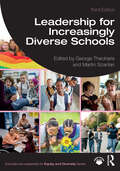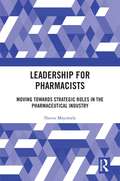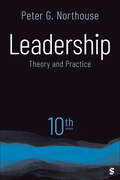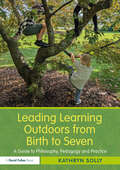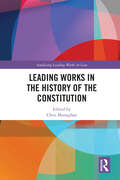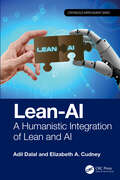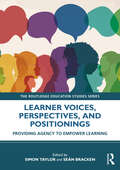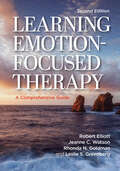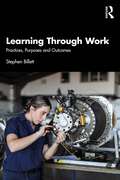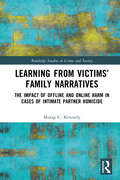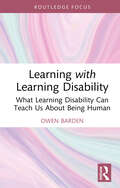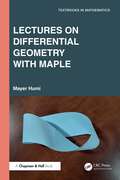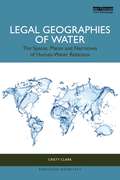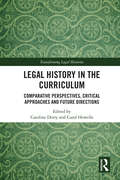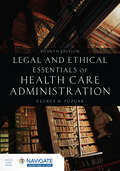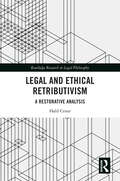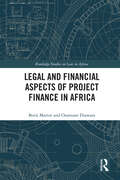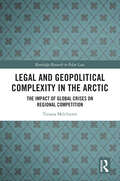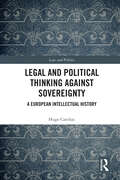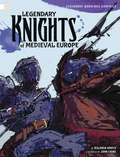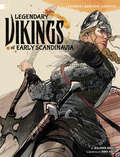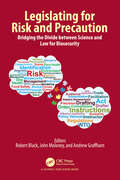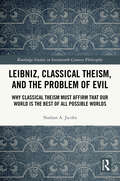- Table View
- List View
Leadership for Increasingly Diverse Schools (Educational Leadership for Equity and Diversity)
by Martin Scanlan George TheoharisThe third edition of the best-selling Leadership for Increasingly Diverse Schools helps both practicing and aspiring school leaders deepen their knowledge, skills, and dispositions to create schools that best serve all students. This book helps readers sharpen their awareness of how students’ multiple dimensions of diversity intersect, as well as develop strategies for leading schools where students of all socioeconomic statuses, races, religions, gender and sexual identities, languages, and disabilities flourish. Leadership for Increasingly Diverse Schools provides school leaders with the theory, research, and practical guidance to foster teaching and learning environments that promote educational equity and excellence for all students.Special features: Each chapter focuses on a specific dimension of diversity and discusses intersectionality across other areas of difference, including disability, language, race, socioeconomic status, sexual and gender identity, religion, and social ecosystems. Chapters synthesize literature, share practical strategies and tools, include school-level and district-level cases illustrating inclusive leadership, and provide extended learning opportunities. This new edition is updated throughout, including greater focus on strategies for readers’ professional development, expanded coverage of educational infrastructure, and discussion of current political context and discourse including anti-DEI movements. Online Support Material features additional resources, documents, and links to videos and podcasts described in the chapters, accessible at https://www.routledge.com/9781032901046
Leadership for Pharmacists: Moving Towards Strategic Roles in the Pharmaceutical Industry
by Nsovo MayimeleThis book provides a toolkit of leadership skills for pharmacists wishing to take more strategic roles within the pharmaceutical industry, outlining a range of ten competencies through which their existing technical knowledge can be elevated to offer managerial as well as pharmaceutical expertise.Written in response to the lack of pharmacists in leading roles within the pharmaceutical industry, each chapter explores a different leadership skill, and how these can be applied. The skills include emotional intelligence, teamwork, integrity, selfless service, communication and relationship management. Supported by interviews with senior figures within the pharmaceutical industry, this book suggests that pharmacists themselves have the capacity to play an important, progressive role in leading these organisations and improving patient care.This book will interest students and researchers of pharmacy, leadership and industry studies, as well as pharmacists practising today.
Leadership: Theory and Practice
by Peter G. NorthouseNow with a new chapter on Social Identity Leadership! Adopted in thousands of courses in 89 countries and translated into 15 different languages, this market-leading text successfully combines an academically robust account of the major theories and models of leadership with an accessible style and focus on how leadership theory can inform leadership practice. Peter G. Northouse uses a consistent structure for each chapter of the Tenth Edition of Leadership, allowing readers to easily compare and contrast different theories. This text is offered in Sage Vantage, an intuitive learning platform that integrates quality Sage textbook content with assignable multimedia activities and auto-graded assessments to drive student engagement and ensure accountability. Unparalleled in its ease of use and built for dynamic teaching and learning, Vantage offers customizable LMS integration and best-in-class support. Interactive Leadership Assessments Available only in Sage Vantage, Interactive Leadership Assessments unlock your students’ potential, providing personalized score analysis to identify their unique leadership strengths, targeted feedback tied to essential leadership traits, and actionable strategies that transform theory into personal growth.
Leadership: Theory and Practice
by Peter G. NorthouseNow with a new chapter on Social Identity Leadership! Adopted in thousands of courses in 89 countries and translated into 15 different languages, this market-leading text successfully combines an academically robust account of the major theories and models of leadership with an accessible style and focus on how leadership theory can inform leadership practice. Peter G. Northouse uses a consistent structure for each chapter of the Tenth Edition of Leadership, allowing readers to easily compare and contrast different theories. This text is offered in Sage Vantage, an intuitive learning platform that integrates quality Sage textbook content with assignable multimedia activities and auto-graded assessments to drive student engagement and ensure accountability. Unparalleled in its ease of use and built for dynamic teaching and learning, Vantage offers customizable LMS integration and best-in-class support. Interactive Leadership Assessments Available only in Sage Vantage, Interactive Leadership Assessments unlock your students’ potential, providing personalized score analysis to identify their unique leadership strengths, targeted feedback tied to essential leadership traits, and actionable strategies that transform theory into personal growth.
Leading Learning Outdoors from Birth to Seven: A Guide to Philosophy, Pedagogy and Practice
by Kathryn SollyThis book reveals how early childhood leaders and practitioners can lead and enhance children’s play, learning and experiences outdoors. It considers all aspects of outdoor provision from the importance of the setting’s vision, routines, boundaries and expectations to the impact of staff and parental attitudes.The book explores the benefits of the outdoor environment for children and how it benefits all areas of learning and development. Covering the role of the adult, the environment and resources at different ages and stages of development, the chapters offer practical guidance on creating high-quality outdoor play experiences for all children throughout the year. Kathryn Solly also addresses common barriers to outdoor learning and highlights the strategies that can be used to champion outdoor learning with colleagues, leaders and managers, and children and their families.Featuring rich case studies and photographs to illustrate good practice, this is essential reading for early years leaders, managers, educators and students.
Leading Works in the History of the Constitution (Analysing Leading Works in Law)
by Chris MonaghanThis collection brings together academic analysis of leading contemporary accounts of the British Constitution with key constitutional documents and sources while also offering analysis of the leading histories of the Constitution.The works in question represent examples of the constitutionally most significant legislation, judicial decisions and commentaries by scholars and key actors. Its scope is the 700 years of English and then British history from the Magna Carta to Britain as an imperial power grappling with the question of how to govern India.The contributors, presenting a balance of established academics and early career researchers, present an original and succinct account of the significance of each leading work. They draw upon the context in which it was written, contemporary literature and more modern academic analysis of the work and its author(s).Presenting a complement to standard texts on the history of the Constitution, the book will be of interest to researchers and academics working in the areas of Constitutional Law and Politics, Public Law and Legal History.
Lean-AI: A Humanistic Integration of Lean and AI (Continuous Improvement Series)
by Elizabeth A. Cudney Adil DalalWe stand at the threshold of a transformative era where the convergence of Lean methodologies and artificial intelligence (AI) is redefining operational excellence. This book is a pioneering exploration of this integration, offering a roadmap for organizations seeking to harness AI’s potential while preserving the human-centric values at the heart of Lean. It provides a deep dive into how Lean principles – focused on efficiency, waste reduction, and continuous improvement – can be enhanced through AI-driven intelligence, agility, and innovation. More than just a technical guide, this book is an invitation to rethink the future of work, leadership and culture in an AI-powered world.Lean-AI: A Humanistic Integration of Lean and AI empowers readers with the tools and insights necessary to navigate the evolving landscape of Industry 5.0+. Through real-world case studies, practical strategies, and in-depth discussions, this book illustrates how organizations can leverage AI to accelerate Lean transformation, enhance human performance, and drive sustainable growth. Readers will gain actionable knowledge on integrating AI with Lean tools such as 5S, poka-yoke, single minute exchange of dies, total productive maintenance, and value stream mapping, among others. The book also highlights the critical role of leadership and culture in ensuring AI-driven Lean implementations uplift rather than replace human capabilities.This book is designed for forward-thinking innovators, business leaders, Lean practitioners, and AI enthusiasts eager to explore the synergy between technology and human-centric process improvement. Whether you are an executive driving digital transformation, a Lean expert looking to modernize methodologies, or a professional seeking to understand AI’s role in operational excellence, this book provides a strategic guide to mastering Lean-AI integration. It is an essential read for those ready to challenge conventional paradigms and embrace the future of efficiency, collaboration and intelligent innovation.
Learner Voices, Perspectives, and Positionings: Providing Agency to Empower Learning (The Routledge Education Studies Series)
by Simon Taylor Seán BrackenThis book explores the multifaceted concept of learner voice in education, emphasising its significance across various contexts and historical periods. It brings together diverse perspectives from multiple authors, addressing how learner agency can shape educational practices and policies, particularly in contemporary settings.The chapters delve into critical themes such as the influence of teachers' beliefs on student learning, the impact of polarisation in our current educational discourse and the historical voices of children in Victorian schools. Notable case studies include a narrative approach to understanding higher education students' experiences and the examination of learner voice within prison education. The book also addresses pressing issues such as the representation of marginalised voices and the importance of inclusive practices in school leadership and curriculum design. Groundbreaking content includes discussions on "epistemic violence", highlighting the need for a more nuanced, considered and critically aware approach to learner representation.This important collection will be essential reading for educational studies students and trainee teachers, as well as educators working in further or higher education. It provides practical insights and theoretical frameworks that constitute a roadmap for strengthening diverse learners’ voice and agency, thereby advancing educational equity and inclusion for all.
Learning Emotion-Focused Therapy: A Comprehensive Guide
by Leslie S. Greenberg Jeanne C. Watson Robert Kingwill Elliott, Jr. Rhonda N. GoldmanUpdates a classic emotion-focused therapy reference with over 20 years of research and theory. The first edition of this book became the standard reference and training work for a generation of emotion-focused therapy (EFT) practitioners. This second edition aims to inspire a new generation of emotion-focused therapists by offering fully updated coverage of EFT theory and practice, alongside the most exciting theoretical, practical, and organizational developments of the past 20 years. Updates to this new edition include: New integrated models of emotional deepening and EFT case formulation, New questions and activities for self‑reflection, Deepened theoretical formulations of the nature and functions of emotions such as anger and shame, A comprehensive review of the existing research base in EFT, and A supplemental website with an editable sample syllabus to enhance teaching and training (see https://www.apa.org/pubs/books/learning-emotion-focused-therapy-second-edition). In EFT, therapists cultivate a deeply empathic, caring presence. They follow their client&’s lead while delivering gentle, flexible guidance. The goal is to facilitate a process of emotional deepening in clients as they progress from global distress to an acceptance of core pain, enabling them to emerge with a new perspective through useful, adaptive emotions.
Learning Through Work: Practices, Purposes and Outcomes
by Stephen BillettDrawing on three decades of practical investigations, this book establishes new understandings about the importance of learning through work, outlining its purposes, contributions, conceptions and the curriculum, pedagogical and personal practices that shape its effectiveness.Against views proposing it as being informal and leading to concrete outcomes, this volume presents learning through work as being central to human development, informing individual choices and developing one’s capacity for working life and occupational competence. In Part I, Billett makes a case for the value of learning through work and why it should be considered and engaged with as a legitimate mode of learning and model of education. Part II sets out the foundations for the processes of learning through work that have underpinned its utility across human history. Part III sets out bases by which this educational model and mode of learning can be understood through the concepts of practice curriculum, practice pedagogies and personal practices. These are presented based on the kinds of knowledge that they generate and how they can be realised in and through day-to-day work activities in practice settings, including the development of innovations in work settings.A much-needed resource from a leading expert in the field, this book will be of interest to educators, workplace trainers in a variety of settings, policy-makers and students in professional education courses.
Learning from Victims’ Family Narratives: The Impact of Offline and Online Harm in Cases of Intimate Partner Homicide (Routledge Studies in Crime and Society)
by Morag C. KennedyOffering a new perspective on intimate partner abuse and homicide, this book recognises the families of victims as legitimate agents of knowledge in terms of the harm experienced by their family members, and considers how this harm is extended to the families themselves.Examining harm from both an offline and online point of view, the book explains the multipurpose roles of offline and online harm and how these roles do not occur in isolation in terms of the victims’ and families’ abusive experiences. In doing so, it demonstrates the range of harm experienced in the context of intimate partner abuse and homicide, and outlines the overlapping nature of offline and online harm without prioritising one form of harm over the other; instead, considering the harm experienced as a continuum.Providing theoretical and empirical contributions that are largely absent from existing victimology and harm literature, Learning from Victims’ Family Narratives: The Impact of Offline and Online Harm in Cases of Intimate Partner Homicide will be of interest to scholars, researchers, students, and practitioners exploring the modern conceptualisation of harm and its impact on individuals beyond the victim and perpetrator
Learning with Learning Disability: What Learning Disability Can Teach Us About Being Human (Autocritical Disability Studies)
by Owen BardenThis book uses the concept of “learning disability” to explore what it means to be human. It argues that we need to learn with rather than from or about learning disability. This crucial distinction means being open to what learning disability can teach us about what it means to be human. This approach comes from recognising learning disability as an organising concept – a concept which radically transforms our sense of what it means to be – or not be – a person.After reflecting on the author’s relationship to learning disability, the book explores relationships and tensions between conceptualisations of learning disability and of the human. Through historical ontology, the book initially examines how the phenomenon of “learning disability” came into being. It then explores ways in which the concept of learning disability has, over the course of the 20th and 21st centuries, radically transformed our sense not only of education and learning, but also of who is or is not deemed entitled to full citizenship and the associated rights, and so who is or is not fully human. Each chapter of the book exposes tensions and contradictions apparent in the ways we tend to think about personhood and learning disability, illuminating them through a series a binary oppositions: human and not fully human; menacing and vulnerable; controlled and abandoned; capable and incapable; human and posthuman.The book concludes by drawing together these tensions and contradictions to challenge the prevailing metanarrative of disability and make the case for a more inclusive conceptualisation of what it means to be human.It will be of interest to all scholars and students of disability studies, the history of learning disability, humanism and posthumanism, and learning disability advocacy.
Lectures on Differential Geometry with Maple (Textbooks in Mathematics)
by Mayer HumiThis text is designed to update the Differential Geometry course by making it more relevant to today’s students. This new approach emphasizes applications and computer programs aimed at twenty-first-century audiences. It is intended for mathematics students, applied scientists, and engineers who attempt to integrate differential geometry techniques in their work or research.The course can require students to carry out a daunting amount of time-consuming hand computations like the computation of the Christoffel symbols. As a result, the scope of the applied topics and examples possible to cover might be limited. In addition, most books on this topic have only a scant number of applications.The book is meant to evolve the course by including topics that are relevant to students. To achieve this goal, this book uses numerical, symbolic computations, and graphical tools as an integral part of the topics presented. This book provides students with a set of Maple/MATLAB® programs that will enable them to explore the course topics visually and in depth. These programs facilitate topic and application integration and provide the student with visual reinforcement of the concepts, examples, and exercises of varying complexity.This unique text will empower students and users to explore in depth and visualize the topics covered, while these programs can be easily modified for other applications or other packages of numerical/symbolic languages. The programs are available to download for instructors and students using this book for coursework.
Legal Geographies of Water: The Spaces, Places and Narratives of Human-Water Relations (Earthscan Water Text)
by Cristy ClarkThis book deepens our understanding of humanity’s diverse relationships with water and the law, providing a critical assessment of this relationship, and charting the course towards a more sustainable and just water future.By using legal geography, this book pays particular attention to the place-based inter-relationships between water, people, and law (both formal and informal) and to the ways that law both constitutes and is constituted by the relationship between people and place. Starting in the 1980s, Chapter 2 investigates the early commodification of water through the liberalisation of rural water markets in Chile and the urban water supply and sanitation systems of England and Wales. Chapter 3 then examines the global expansion of neoliberal water governance in the 1990s, starting with donor-driven reforms in the global south and particularly Manila in the Philippines. Chapters 4 and 5 document both the grassroots response to these neoliberal water reforms and the inherent tensions in the attempts of the early 2000s to reconcile the recognition of a human right to water with the ongoing rollout of market mechanisms, both in the domestic context of South Africa and within the United Nations human rights system. Moving forward again, Chapter 6 examines the recent intensification of neoliberal water governance through financialisation and considers its specific impacts in Detroit and Flint, Michigan. Chapter 7 then considers the renewed global emphasis on living waters and Indigenous ontologies of water by examining the new legislative arrangements for the Whanganui River in Aotearoa, New Zealand. The book concludes in Chapter 8 by highlighting the stories of hope that can be found in many of the case studies explored in the book and in emerging examples from around the world.This book is essential reading for students and scholars interested in water law, security, and justice from across a wide range of disciplines, including environmental studies, law, geography, human rights, and political ecology.
Legal History in the Curriculum: Comparative Perspectives, Critical Approaches and Future Directions (Transforming Legal Histories)
by Caroline Derry Carol HowellsAs legal education faces fresh challenges and opportunities, and a growing literature calls for subversive new approaches, this book engages with vital questions about the place of history in the law school. How and why should we teach legal history? What is its place in the curriculum? What can different jurisdictions learn from each other? This collection offers an overview and examples of cutting-edge practice in teaching legal history across the law curriculum, challenging expectations of its place and potential. The book’s three sections explore practices and possibilities in the core curriculum, in dedicated legal history courses and in law schools across the world. They highlight how legal history offers diverse and inclusive content, global perspectives, and transnational understandings to students. By exploring contributors’ own purposes and practices, they provide insight and fresh ideas on how and why readers can incorporate legal histories into their own teaching.The volume will be an invaluable resource for all those involved in the teaching of law and the law school curriculum.
Legal and Ethical Essentials of Health Care Administration
by George D. PozgarOffering a comprehensive and updated review of both health law and ethics, Legal and Ethical Essentials of Health Care Administration, Fourth Edition provides the reader with the necessary knowledge to become conversant with both legal and ethical issues pertinent to the healthcare profession. Using reader-friendly language, the book presents actual court cases, state and federal statues, and common-law principles to help the student understand the practical application of the concepts learned. The author includes a broad discussion of the legal system, including the sources of law and government organization as well as basic reviews of tort law, criminal issues, contracts, civil procedure and trial practice, and a wide range of real-life legal and ethical dilemmas that caregivers have faced as they wound their way through the courts.
Legal and Ethical Retributivism: A Restorative Analysis (Routledge Research in Legal Philosophy)
by Halil CesurThis book explores a foundational philosophical tension in contemporary retributivism, revealing ambiguities in its approach to punishment between two conflicting conceptions of restoration: legal justice and ethical love. Through an analysis of the three parties involved in a crime – the victim, the offender and the state – it argues that neo-retributivism has not sufficiently incorporated the ethical face of punishment into its theoretical framework. The pull of legal justice is often so strong that the voice of ethical love is silenced; neo-retributivism is at an impasse. To navigate this, the book engages with contemporary critical criminal justice scholarship, introducing the ideal of loving justice while highlighting an unresolved tension between penal reformism and abolitionism.The book will be of interest to academicians and researchers working in the areas of philosophy of punishment, criminal law theory, criminal justice, restorative justice, philosophy of law, political philosophy and Hegel scholarship.
Legal and Financial Aspects of Project Finance in Africa (Routledge Studies on Law in Africa)
by Boris Martor Ousmane DiawaraThis book offers a comprehensive analysis of the specifics of project financing in Africa and suggests how to structure and operate those projects in an emerging continent. Infrastructure development in Africa is essential to meet the needs of the population and is a major lever for economic and social development. Financing solutions exist to offset the limited investment capacity of African sovereign States, particularly through involving the private sector and project financing. In view of the challenges and specific features of the African continent, this book looks at the ways in which project financing is used in the region. Describing the structuring of infrastructure projects from inception to development and financing and then construction, the book offers insights into African legal frameworks and drafting of financing contracts, and preparation of financial models. It also covers management of disputes and the principles of bankability. Offering a global yet harmonised view of applicable regulatory frameworks, the book is a practical and comprehensive guide to project finance and business law in Africa.This book will be of interest to practitioners, researchers and students in the field of finance law, business and banking law and law in Africa.
Legal and Geopolitical Complexity in the Arctic: The Impact of Global Crises on Regional Competition (Routledge Research in Polar Law)
by Tiziana MelchiorreThis book examines the evolving geopolitical landscape of the Arctic, focusing on the impact of climate change and the war in Ukraine on regional and international relations from a legal and geopolitical perspective.As Arctic ice melts, newly accessible natural resources and transportation routes are intensifying territorial and maritime disputes, heightening competition and tensions among regional states. The war in Ukraine has further strained relations between the West and Russia, disrupting political, economic, and scientific cooperation while accelerating the militarisation of the Arctic. In response to Russia’s aggressive actions in Eastern Europe, Western states have expanded their military presence in the region, while Russia has modernised its Arctic military infrastructure. Through analysing these developments, the book highlights the interconnection between regional and global dynamics. It argues that climate change and geopolitical conflict are transforming the Arctic from the ‘last frontier’ into the ‘first frontier’; a strategic arena where states, both within and beyond the region, seek to assert their geopolitical and economic interests. Adopting an interdisciplinary approach that integrates international relations, international law, and history, this book provides a comprehensive examination of the Arctic’s legal and geopolitical complexities.The book will be of interest to researchers in the field of international relations and public international law, as well as environmental and Arctic law.
Legal and Political Thinking Against Sovereignty: A European Intellectual History (Law and Politics)
by Hugo CanihacAt the intersection of the history of constitutional ideas and of political theory, this book offers a new genealogy of the constitutional thought of the European Union. Centrally, the book traces the emergence and transformation of the ‘post-sovereign thesis’ – an argument that seeks to move beyond the routine opposition between states and European organization, by claiming the concept of sovereignty to be obsolete – and its complicated relationship with liberalism. Analyzing the thought of a series of constitutional thinkers who have developed different versions of this thesis in relation to European integration, the book shows that, far from being new, as is generally assumed, the post-sovereign thesis goes back to the late nineteenth century. Exploring the interplay of these thinkers’ critical conceptualizations of sovereignty and of their views on liberalism, the book argues that, although they shared a concern for the transformation of a world seen as increasingly interdependent, they imagined deeply different versions of post-sovereignty. Bringing this history into focus, the book offers a rich new perspective on contemporary debates about the EU and the possibilities of global constitutionalism. This book will appeal to scholars and students working in the fields of EU and constitutional law, legal history and the history of political thought, as well as others with relevant interests working in political science.
Legendary Knights of Medieval Europe
by Benjamin HarperFrom the battlefield to the tournament grounds, medieval knights lived by codes of honor: loyalty, bravery, and chivalry. But becoming a knight wasn’t easy. Young fighters trained for years to master swords, shields, and horseback combat. Armed with shining armor and deadly weapons, these famed warriors fought in brutal wars and daring campaigns across Europe. Some became legendary, like King Arthur’s Knights of the Round Table or the brave warriors of the Hundred Years’ War. Through dynamic paneled art and gripping text, this action-packed graphic novel is perfect for history buffs and reluctant readers alike.
Legendary Samurai of Medieval Japan
by Benjamin HarperHonor. Loyalty. Mastery. The samurai were medieval Japan’s most elite warriors, sworn to serve their lords and protect their lands. Living by a strict code, they trained in deadly swordsmanship, archery, and strategy, mastering combat skills that made them nearly unstoppable on the battlefield. With high-energy illustrations and gripping text, this action-packed graphic novel takes readers into the world of history’s most legendary fighters.
Legendary Vikings of Early Scandinavia
by Benjamin HarperRaiders. Warriors. Explorers. The Vikings of ancient Scandinavia struck fear into the hearts of their enemies as they set sail in their dragon-headed longships. With battle axes in hand, these fearless fighters raided coastal villages, conquered new lands, and forged an empire that stretched from North America to Russia. But they weren’t just warriors; they were traders, shipbuilders, and storytellers whose influence still endures today. With high-energy illustrations and gripping text, this action-packed graphic novel explores the world of the Viking warriors who changed history forever.
Legislating for Risk and Precaution: Bridging the Divide between Science and Law for Biosecurity
by Robert Black John Moloney Andrew GraffhamThis book aims to demystify the law for scientists and instructing officials by exploring the science and legal concepts of risk and precaution for national legislation to facilitate safe trade in agricultural products (in compliance with international trade rules).The book is not meant to supplant the many authoritative titles on legislative drafting, but provide some practical exercises on instructions and drafting for this area of law. The book also includes some important factors in legal reform, such as the audience for and access to legislation. It, therefore, has the potential to be a valuable resource for coordinated training of instructors and drafters by helping to secure a robust two-way dialogue between them.
Leibniz, Classical Theism, and the Problem of Evil: Why Classical Theism Must Affirm That Our World is the Best of All Possible Worlds (Routledge Studies in Seventeenth-Century Philosophy)
by Nathan A. JacobsThis volume offers a defense of Leibniz’s theodicy and his infamous claim that our world is the best of all possible worlds. It considers Leibniz’s rationale for “optimism,” examines its roots in ancient and medieval thought, and forwards a novel rereading of Leibniz’s theory of freedom in light of this background, all of which highlights the very real challenges of evading optimism from within the framework of classical theism. Gottfried Leibniz is known for his “theodicy,” or defense of God's Goodness, Wisdom, and Justice despite the realities of evil in our world. This book argues that Leibniz’s optimism is inevitable for proponents of classical theism and even for many not-so-classical theists. The author’s argument is threefold. First, he demonstrates that Leibniz's theodicy is deeply rooted in the classical theist tradition, pagan and Christian, and shows that the philosopher of Leipzig is merely following these commitments to their logical conclusion, a conclusion that long precedes Leibniz. Second, he offers a novel rereading of Leibniz in the light of his philosophical and theological antecedents, a reading that, if correct, dispels ubiquitous but problematic assumptions about Leibniz's case, specifically those about divine and human freedom. Third, he demonstrates the analytic tether that connects classical theism to Leibniz’s conclusion, making his notorious optimism virtually inevitable for proponents of classical theism — and even for not-so-classical theists. This book demonstrates the ways in which Leibniz is relevant to not only classical theists and students of Modern philosophy but also to contemporary philosophers of religion more generally and philosophical theologians who are concerned with the problem of evil. Leibniz, Classical Theism, and the Problem of Evil will appeal to scholars and graduate students interested in Leibniz, philosophy of religion, history of philosophy, philosophical theology, free will, and the problem of evil.
